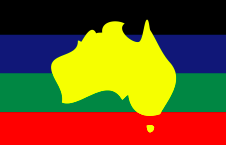|
Vol 13, Issue 1 TYSON HOLLOWAY-CLARKE There are people out there in the wide world who have only just found out about their Indigenous heritage. For some, it is a less recent occurrence, but something they haven’t really acted on. For me this is unthinkable and alien. My father and mother, aunties and uncles, have always told me that I am a proud Aboriginal man for as long as I can remember. I cannot recall a time in my life where I didn’t know I was Aboriginal. My understanding of being Aboriginal would evolve over time but I always have had that label. On top of that, the people I meet find out pretty quickly. A few years ago I was passing by a friend, we exchanged pleasantries and kept going on our separate ways. Then they spun on the spot, and asked me if I could help them. They knew that they had Aboriginal ancestors, recent ancestors, and they wanted to know if that made them Aboriginal. I responded rather glibly with another question: ‘Do you feel Aboriginal?’. They said they didn’t know. I agreed to help them find out more if they wanted to know more, but that was practically the last we spoke of it.
In the last two years I have been on both an academic and personal mission to reconstruct my own Aboriginality. I have had the privilege of being firm in my identity for most of my life, but I wanted to know more, record what I learnt, and share what I had learnt. I spent time with my father, aunties and uncles learning from them. I travelled to Roeburn to visit my great-grandmother’s grave and connect with my extended family. I wrote an honours thesis on my grandmother’s experience as a stolen child, why these stories aren’t told the way they should be, and how we might do them justice. In doing this I deepened my understanding of myself and it has shaped who I want to become. My next steps are learning the Njamal language and contributing as a member of our People’s Trust. My survival as an Aboriginal man and our people’s ability to adapt and survive in contemporary Australia is our strongest form of resistance against the forces of colonialism that would have seen us wiped out. This survival has not been without its casualties. Too many languages have been lost. Too many families sundered. Too much death and despair. Nonetheless, languages like Wiradjuri are beginning to flourish. Yolngu people host many thousands - including the Prime Minister - every year. We take over the streets of Melbourne every January 26th. We have something taken away from us, we resist, then we take it back. Today Indigenous elders and peoples alike are working to ensure the survival of and facilitate the thriving of Indigeneity through culture. But what if you have had everything taken away from you? What if one of your ancestors lost it all and was swallowed by the injustices of the past? Their body lived on, but their Aboriginality died to make it so. If that was your grandmother or grandfather or their parents, are you still Aboriginal? That is an uncomfortable reality for many Aboriginal people. Many people had no choice: they were taken from their mothers, families and communities. Such a practice continues on today. Others were given an ultimatum: sign these forms and forfeit your status as a Native, or be subject to the state in eternity. In some places even associating - that is, meeting and knowing other Aboriginal people - was illegal and subject to police investigation. If you wanted to live a life free of harassment, and have a chance to keep your children, you had to suppress your Aboriginality. Today is a slightly more kind time. Being Aboriginal is not an immediate sentence, but it still carries with it heavy baggage. At the very least we can exist, having survived. But what again of those that were lost but still live? Aboriginality has not gone anywhere. Languages and culture are alive. They desperately need and want people to come and ensure their survival. After all, what is a language that nobody speaks? I could not think of a more genuine Aboriginal experience than losing what you had, resisting and biding your time, and then taking it all back. It is never too late. We are a big mob. Tyson Holloway-Clarke is a first year JD student More articles like this The rest of this issue:
Kassie
27/2/2018 08:26:56 pm
WE ARE A BIG MOB!!! This was written so well, thanks for submitting this Ty! :) xxx
Uncle Drew
27/2/2018 11:26:56 pm
Thanks Tyson. Finding my own way to regain what my ancestors had to hide just to survive has been a long and tough road. I feel I may forever be finding my own path in that journey but every bit I gain back justifies the effort. Thanks for such lovely words I can remember to keep me strong.
Peggy
1/3/2018 08:52:55 am
What a fantastic article Tyson. This nuance is vital in the face of racial illiteracy and ignorance which often displays itself in discussions of the indigenous identity of people of mixed heritage. I'm speaking specifically about indigenous people who may appear Caucasian and are therefore subject to not only internal identity struggles (associated with many of the historical issues you discussed regarding families renouncing native status) but also the external struggles of acceptance as being "authentically indigenous". These are live issues we should all consider, especially non-indigenous people like myself, so that we do not ignorantly reinforce oppressive structures. Thank you for speaking to this. Comments are closed.
|
Archives
October 2022
|



